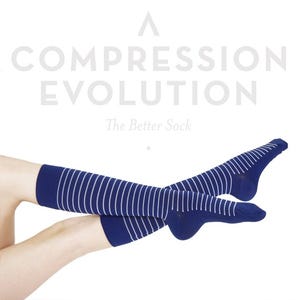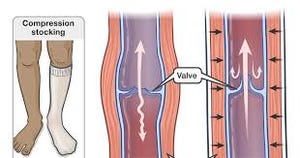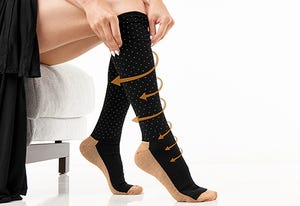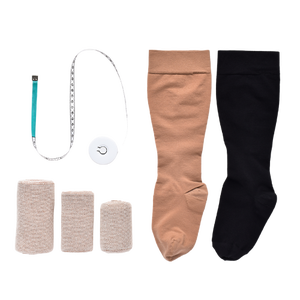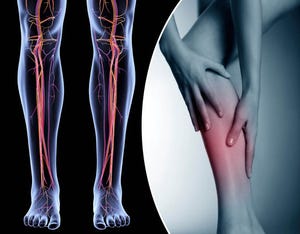When it comes to managing various health conditions and improving overall well-being, compression socks have become increasingly popular. They are designed to enhance blood circulation and alleviate symptoms like swelling and pain in the legs. But can you sleep in compression socks? In this blog post, we'll explore the pros and cons of wearing compression socks while sleeping, helping you make an informed decision about whether it's right for you.
Wearing Compression Socks While Sleeping:
The idea of wearing compression socks during sleep is a topic of debate among medical professionals. Here are some points to consider:
- Comfort: Comfort is paramount when it comes to sleep. Some individuals may find compression socks uncomfortable to sleep in, especially if they are not used to wearing them.
- Allergic Reactions: Prolonged exposure to compression material may cause skin irritation or allergies in some people. Be mindful of any adverse reactions.
- Sleeping Position: Sleeping positions can affect the effectiveness and comfort of compression socks. For example, side sleepers may find them less comfortable than back sleepers.
- Medical Guidance: Before wearing compression socks while sleeping, it is advisable to consult with a healthcare professional, as they can provide personalized recommendations based on your specific needs and medical conditions.
The Benefits of Compression Socks:
Compression socks, also known as compression stockings or support socks, are commonly used during the day to help with several medical conditions, such as varicose veins, deep vein thrombosis (DVT), and edema. These socks work by applying gentle pressure to the legs, which aids in pushing blood back towards the heart, reducing swelling, and preventing blood clots.
- Improved Circulation: One of the primary benefits of compression socks is improved blood circulation. This can be particularly helpful for people who spend long hours on their feet or have circulation issues.
- Reduced Swelling: Compression socks are designed to reduce swelling, making them an excellent choice for individuals dealing with edema or post-surgery recovery.
- Prevention of Blood Clots: Compression socks can lower the risk of developing blood clots, especially in situations where prolonged immobility is a concern, such as long flights or bed rest after surgery.
Another reason to wear compression socks at night
Another group of people who benefit from wearing socks or tights with graduated compression at night are people who have orthostatic hypotension. Orthostatic hypotension is a condition that causes dizziness or sometimes complete loss of consciousness when moving from lying down to standing up. People who have orthostatic hypotension may be prone to passing out as soon as they get out of bed in the morning. Falling to the floor is a really bad way to start your day.
Wearing compression socks at night may keep enough blood flowing back up the veins of the legs to the heart and brain to prevent orthostatic hypotension. They are an inexpensive, side effects-free alternative to other treatments of the condition involving blood pressure drugs.
You shouldn't stop using prescribed treatments for sleep apnea or orthostatic hypotension without consulting your doctor first. Chances are that your doctor will tell you that it's OK to wear compression socks all night but you should continue other treatments just to be sure. Wearing graduated compression at night may just help you feel better in the morning — but that is worth something, too.
What if you just like to sleep in your compression socks?
It's OK to sleep in your compression socks. You can even wear compression socks 24 hours a day if you like. You just shouldn't wear the same compression socks 24 hours a day, day after day, night after night. You need to wash your legs at least once a day, particularly if you have skin problems caused by venous insufficiency, and it's always good to change your socks daily as a matter of good personal hygiene. Ideally, you should wear one pair of compression socks during the day and a different pair of compression socks while you sleep.
Don't use compression socks or compression tights 24 hours a day with the expectation that it will help you with vein issues, however. Graduated compression doesn't do your veins a lot of good while you are lying down, because venous compression primarily helps your veins overcome the force of gravity. When you are lying down, assuming that you sleep lying down, the valves in your veins aren't as stressed as they are when you are sitting or standing, so the added effects of compression socks aren't as noticeable for problems like varicose veins and venous reflux disease. However, for the other two previously mentioned conditions, the effects of wearing compression socks when you sleep can be very noticeable, and you may feel better even if you are just wearing compression socks at night for vein issues.
Always keep your doctor in the loop with any decision you make about wearing compression socks. Your doctor may have experience with other patients that can be helpful to you.
Discount Surgical has compression socks, knee-highs, leggings, and tights in every size and in multiple colors and styles. We have the best compression garments at the best price, and we're here to help you find exactly the compression wear you need.Unless your doctor tells you otherwise, it's OK to wear compression socks while you are sleeping, preferably not the same pair you wear during the day. There are even some conditions that are helped by wearing compression socks at night.
In conclusion, whether you can sleep in compression socks depends on your individual circumstances and comfort level. While they offer numerous benefits, it's essential to weigh the pros and cons and seek advice from a medical professional when considering wearing them during sleep. For many, compression socks are best reserved for daytime use, as they can effectively improve circulation and alleviate discomfort without compromising sleep quality.
Remember, your health and comfort should always be the top priority. If you're unsure about wearing compression socks while sleeping, consult with a healthcare provider to determine the most suitable approach for your unique situation.


